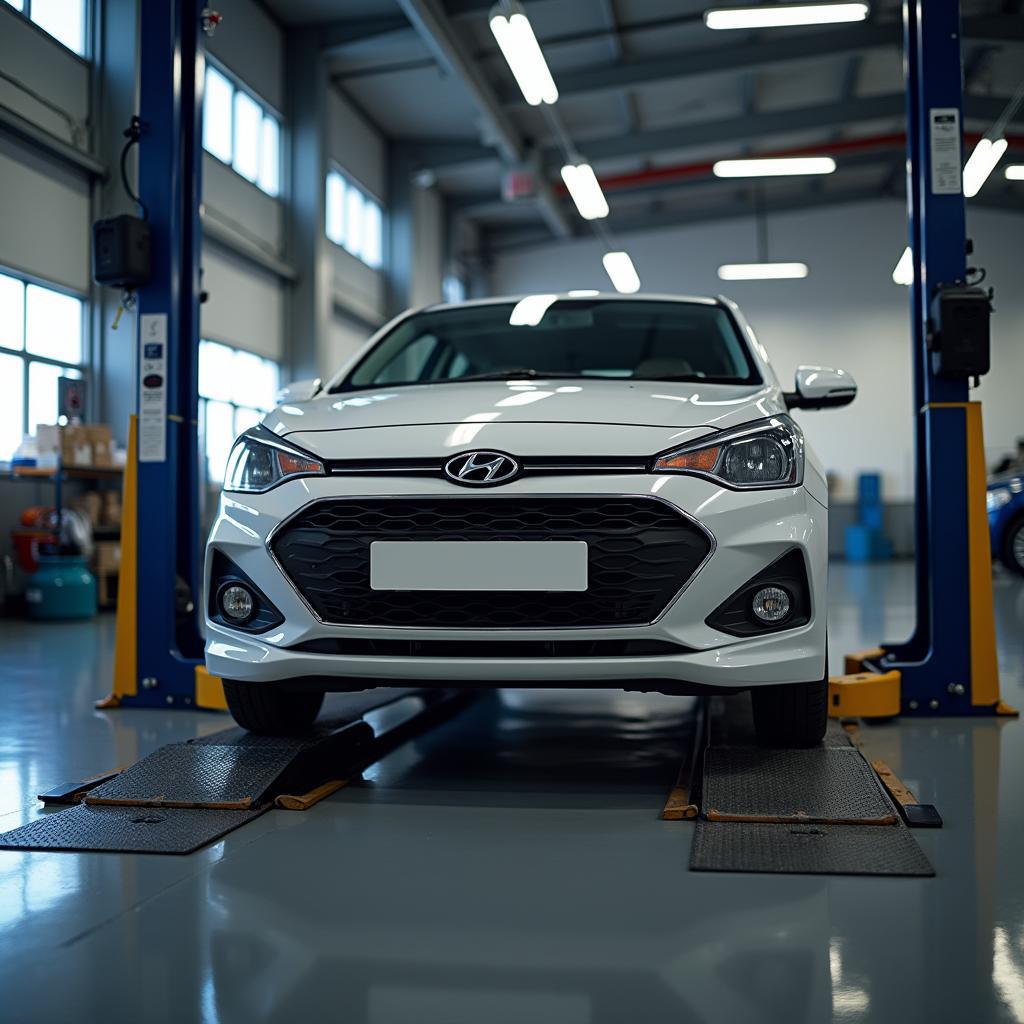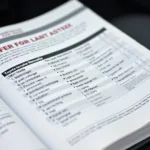Owning a Hyundai i20 is a joy, but like all vehicles, it requires regular maintenance to keep it running smoothly. Following the recommended Hyundai i20 service schedule is crucial for ensuring your car’s longevity, reliability, and performance.
This comprehensive guide dives deep into the Hyundai i20 service schedule, covering everything from basic checks to major service milestones.
Understanding Your Hyundai i20 Service Schedule
Hyundai provides a detailed service schedule in your owner’s manual, outlining specific maintenance tasks and their recommended intervals. These intervals are typically measured in mileage or time, whichever comes first.
Generally, Hyundai i20 service schedules include:
- Oil and filter change: Every 5,000 miles or 6 months
- Tire rotation: Every 5,000 miles
- Brake inspection: Every 10,000 miles or 12 months
- Coolant flush: Every 30,000 miles or 24 months
- Spark plug replacement: Every 30,000 miles
- Air filter replacement: Every 15,000-30,000 miles
- Fuel filter replacement: Every 30,000 miles
Remember that this is a general guideline. Your actual Hyundai i20 service schedule may vary depending on your driving conditions, model year, and engine type.
Decoding Your Hyundai i20 Service Schedule
Understanding the difference between minor and major services is essential for effective car maintenance.
Minor Service
A minor service for your Hyundai i20 typically involves:
- Oil and filter change: This is crucial for lubricating the engine and preventing premature wear.
- Tire rotation: Rotating your tires ensures even wear and tear, extending their lifespan.
- Fluid top-ups: This includes checking and topping up essential fluids like brake fluid, coolant, and windshield washer fluid.
- Visual inspection: Your mechanic will visually inspect various components, such as belts, hoses, and lights, for any signs of wear and tear.
Major Service
A major service for your Hyundai i20 is more comprehensive and usually includes all aspects of a minor service, along with additional checks and replacements:
- Spark plug replacement: Worn-out spark plugs can cause engine misfires and reduced fuel efficiency.
- Air filter replacement: A clogged air filter restricts airflow to the engine, impacting performance and fuel economy.
- Fuel filter replacement: This ensures clean fuel reaches the engine, preventing potential damage.
- Brake inspection and service: Your mechanic will inspect your brakes for wear and tear and replace pads or rotors if necessary.
- Coolant flush: Flushing the cooling system removes contaminants and ensures optimal engine temperature.
“Regularly servicing your Hyundai i20 isn’t just about ticking boxes; it’s about safeguarding your investment and ensuring a smooth, safe, and enjoyable driving experience,” says John Smith, Senior Automotive Engineer at CarServiceRemote.
 Hyundai i20 on a Lift
Hyundai i20 on a Lift
Benefits of Adhering to the Hyundai i20 Service Schedule
Sticking to your Hyundai i20 service schedule offers several benefits:
- Increased Lifespan: Regular maintenance helps prevent premature wear and tear, extending the life of your vehicle.
- Improved Performance: Well-maintained cars tend to perform better, offering smoother acceleration, braking, and handling.
- Enhanced Safety: Regular checks ensure all safety features are in optimal condition, reducing the risk of accidents.
- Fuel Efficiency: A properly maintained engine operates more efficiently, leading to better fuel economy.
- Higher Resale Value: A comprehensive service history increases the resale value of your Hyundai i20.
Don’t Neglect Your Hyundai i20 Service
Skipping scheduled services might seem like a way to save money in the short term, but it can lead to costly repairs and safety hazards in the long run.
“Think of your Hyundai i20 service schedule as preventative healthcare for your car. Addressing minor issues early can prevent them from escalating into major problems,” adds Smith.
Finding a reliable and trustworthy mechanic is crucial for quality car maintenance. Consider using CarServiceRemote’s online platform to book your next Hyundai i20 service appointment with ease.
Conclusion
Your Hyundai i20 is a valuable asset, and following its recommended service schedule is vital for preserving its performance, reliability, and longevity. By staying proactive with your car maintenance, you can enjoy many miles of worry-free driving.
FAQs about Hyundai i20 Service Schedule
1. How often should I service my Hyundai i20?
You should service your Hyundai i20 according to the schedule outlined in your owner’s manual. Generally, this involves a minor service every 5,000 miles or 6 months and a major service every 30,000 miles or 24 months.
2. What happens during a Hyundai i20 service?
A Hyundai i20 service includes a range of checks and replacements depending on whether it’s a minor or major service. This can include an oil and filter change, tire rotation, fluid top-ups, brake inspection, spark plug replacement, air filter replacement, and coolant flush.
3. Can I service my Hyundai i20 myself?
While some basic maintenance tasks can be done at home, it’s best to leave major services to qualified mechanics. They have the expertise, tools, and knowledge to ensure the job is done correctly.
4. What if I miss a service on my Hyundai i20?
Missing a service can void your warranty and potentially lead to more expensive repairs down the line. If you’ve missed a service, it’s best to schedule one as soon as possible.
5. How much does a Hyundai i20 service cost?
The cost of a Hyundai i20 service varies depending on the type of service, your location, and the chosen mechanic.
Need help with your Hyundai i20?
Contact our expert team via WhatsApp: +1(641)206-8880 or email: [email protected]. We are available 24/7 to assist you. You can also check out our Hyundai car free service intervals for more information. For easy and convenient booking, book your Hyundai car service online with us today.

